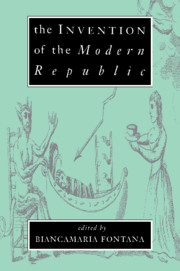Book contents
- Frontmatter
- Contents
- List of Contributors
- Acknowledgements
- Introduction: the invention of the modern republic
- 1 Ancient and modern republicanism: ‘mixed constitution’ and ‘ephors’
- 2 Checks, balances and boundaries: the separation of powers in the constitutional debate of 1787
- 3 From Utopia to republicanism: the case of Diderot
- 4 Cordeliers and Girondins: the prehistory of the republic?
- 5 The constitutional republicanism of Emmanuel Sieyès
- 6 The Thermidorian republic and its principles
- 7 Francesco Mario Pagano's ‘Republic of Virtue’: Naples 1799
- 8 Kant, the French revolution and the definition of the republic
- 9 French historians and the reconstruction of the republican tradition, 1800–1848
- 10 The republic of universal suffrage
- 11 The identity of the bourgeois liberal republic
- Bibliography
- Index
1 - Ancient and modern republicanism: ‘mixed constitution’ and ‘ephors’
Published online by Cambridge University Press: 05 February 2010
- Frontmatter
- Contents
- List of Contributors
- Acknowledgements
- Introduction: the invention of the modern republic
- 1 Ancient and modern republicanism: ‘mixed constitution’ and ‘ephors’
- 2 Checks, balances and boundaries: the separation of powers in the constitutional debate of 1787
- 3 From Utopia to republicanism: the case of Diderot
- 4 Cordeliers and Girondins: the prehistory of the republic?
- 5 The constitutional republicanism of Emmanuel Sieyès
- 6 The Thermidorian republic and its principles
- 7 Francesco Mario Pagano's ‘Republic of Virtue’: Naples 1799
- 8 Kant, the French revolution and the definition of the republic
- 9 French historians and the reconstruction of the republican tradition, 1800–1848
- 10 The republic of universal suffrage
- 11 The identity of the bourgeois liberal republic
- Bibliography
- Index
Summary
An ancient historian who is asked to talk on ancient and modern republicanism faces, perhaps surprisingly, a fundamental problem: he does not know what ancient republicanism is at all. Ancient political theory in its heyday of creativeness during the fifth and fourth centuries BC is focused on republican city-states and their problems in maintaining liberty and stability. Existing monarchies are considered only as survivals from a remote past or as forms of government typical of semi-barbarian areas at the periphery of the Greek world or even as phenomena of oriental despotism. One-man rule could theoretically be considered legitimate only in cases where absolutely the best man should be in power.
City-states, indeed, lived under the threat of tyranny; tyranny was illegitimate domination per definitionem, irrespective of the ruler's actual conduct. The new Empire of the Macedonians and the states which succeeded it were not adequately discussed in political theory. In Rome, the establishment of freedom was associated with the expulsion of the kings, and later the Principate based its legitimacy on the alleged return to republican institutions and rules. Reflections upon ‘the good monarch’ in Hellenistic and Roman imperial times would try to persuade an absolute ruler to act with such self-restraint that people could still consider themselves as free citizens. Thus, since the city-state consisting of a self-governing citizen-body was considered the only legitimate form of political organisation, it is highly problematic to use ‘republicanism’ as a meaningful concept with respect to classical antiquity (at least in pre-Christian times).
- Type
- Chapter
- Information
- The Invention of the Modern Republic , pp. 6 - 26Publisher: Cambridge University PressPrint publication year: 1994
- 9
- Cited by

